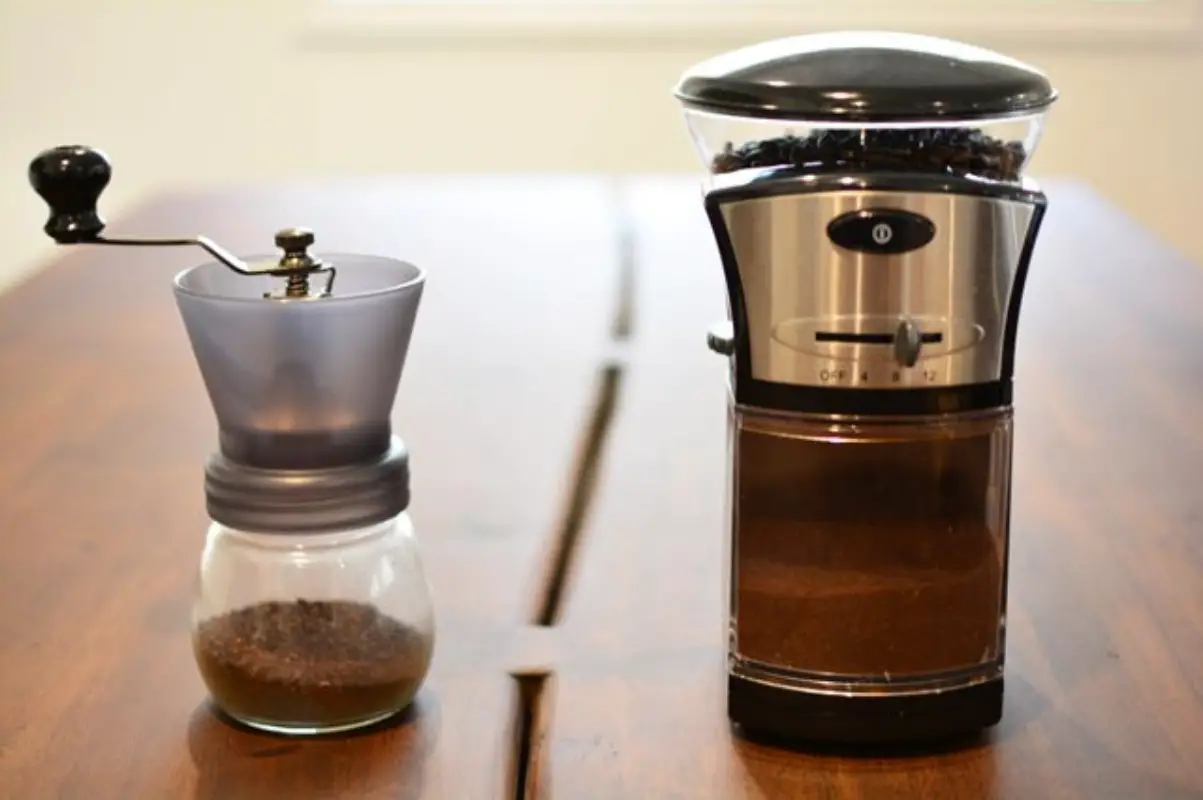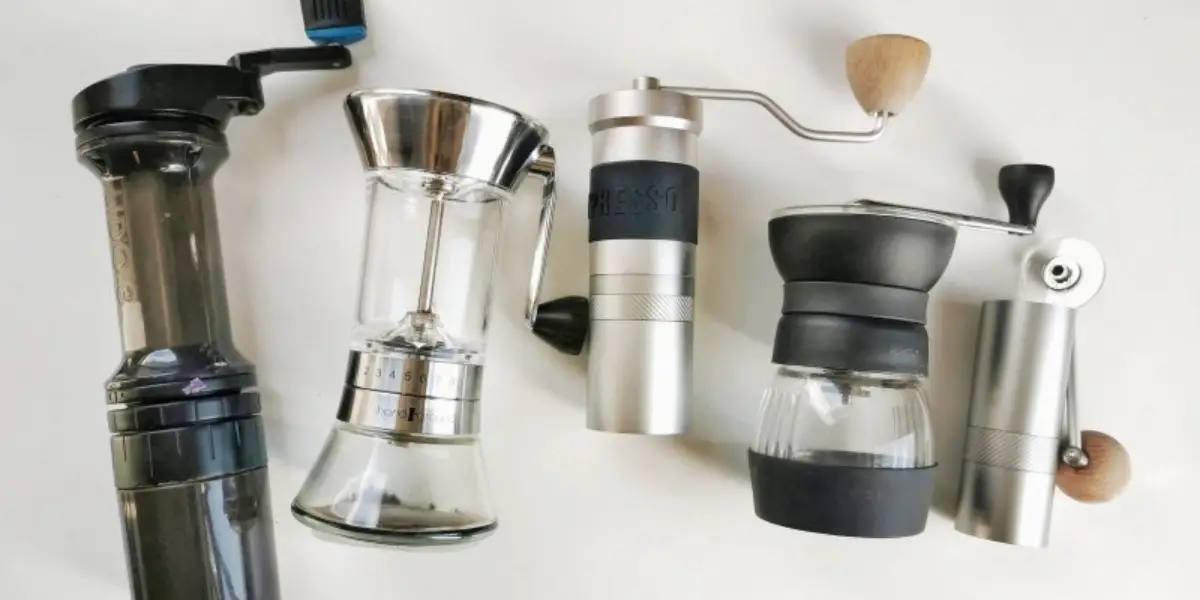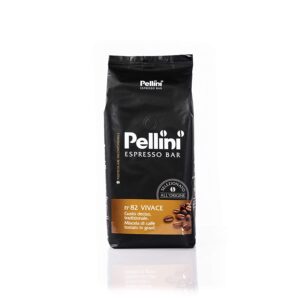
If you are a coffee enthusiast or just a regular coffee drinker, the idea of investing in a coffee grinder has probably crossed your mind once or twice.
Sure, there are more convenient ways of getting coffee in the morning but there is no substitute for freshly ground coffee beans. Once you fall in love with the heavenly aroma of newly shredded coffee you’ll never want to go back to the instant stuff.
Let’s make sure you know everything there is to know about coffee grinders. What to look for in a new one. The difference between burr and blade grinders. Also, let’s take a look at automatic and manual coffee grinders.
It’s important you’re using the correct grind size for your brewing technique so it’s a fitting place to start.
What Size Should My Grind Be?
Each type of coffee drink, coffee machine, or coffee maker needs a different size of coffee grind. The first step in brewing a fantastic cup of java is knowing how coarse or fine your grinds need to be. Grind size refers to the size of the coffee beans you will use while brewing your coffee.
Coarse or thicker coffee grounds are commonly used for automatic coffee machines. Drip coffee makers, pour-overs, and the French press use thicker grounds.
Finer grounds are used for espresso and stovetop “Moka” pots. The extra-fine ground is for Turkish coffee. If you need more information, see this article entirely dedicated to coffee grind size.
You’ll want to make sure your grinder is able to grind to a variety of different sizes. Whether it’s extra-fine, fine, medium, medium-coarse, or coarse.
Many different brewing methods (French press, pour-over, drip coffee, espresso, Turkish coffee, etc.) require different sizes because the size of the grind will influence how water filters through the grounds.
Burr Vs. Blade Coffee Grinders
There are two types of coffee grinders, or more specifically coffee grinders grind up your beans in one of two ways, with burs or with blades.
What major difference exists between these two types? Well, simply coffee grinders with blades cut the coffee beans, the longer you leave the grinder on the finer the bean will be cut.
Have you ever heard of another way of grinding coffee beans? Allow me to introduce you to burr coffee grinders.
Burr
Little known outside of the coffee community, a burr coffee grinder is a preferred choice for most pro-baristas.
Mainly because you can count on the grind of the beans to be equally distributed throughout the batch.
How is it different than the blade coffee grinder? Well, a burr grinder uses two swinging serrated discs(burrs) that crush coffee beans instead of cutting them.
Burr coffee grinders adjust by adjusting the distance between the burs, giving you firm control over the size of your grinds.
Most of these grinders will have two burrs on top of each other. The number on a coffee grinder often referred to the distance between the burrs in millimeters. With one being the smallest distance.
Blade
If you need help with what a blade coffee grinder looks like just imagine the cylindrical coffee grinder with the round cap most people own or remember from their parent’s house.
Blade grinders use blades to shred through coffee beans. Unfortunately, they don’t produce a consistent grind across your batch. Do you think that matters? Believe me, any coffee lover will testify to the importance of an even size across your grinds.
Blade grinders get the job done efficiently with little to no effort. They are commonly used by people who’d rather stick to automatic coffee machines.
If I had to choose, I’d pick the burr grinder almost every time. Although, I understand why the blade grinders are more popular.
I strongly recommend using one of these grinders and brewing fresh coffee instead of using that pre-ground stuff.
Auto Vs. Manual Coffee Grinders

Adding extra work to your morning routine can be enough to turn you away from coffee grinders forever. I promise once you try a cup of joe made from the fresh grind you won’t regret the upgrade.
The real difference here is convenience. Both automatic and manual coffee grinders come with blades or burs and get the job done just as well as you can imagine.
Although I must tell you, there is a reason some of your favorite coffee shops use manual coffee grinders. The coffee seems to taste just that tiny bit better. Maybe having that full control over the entire brewing process just sits better with a true coffee geek.
Final Thoughts
Grind your coffee at home! Avoid pre-ground coffee and don’t subject yourself to lower quality and standards.
Once you know what type of coffee you want to brew and what grind size is most appropriate for the coffee maker, get yourself a grinder and start to enjoy that cup of coffee the way it was meant to be.
Related Questions
Are Coffee Grinders Worth It?
Yes, of course, coffee grinders are worth it. Both burr and blade grinders can increase the quality of the coffee you’re making at home. Regardless if you make coffee manually or use a coffee maker, fresh beans will make your coffee better.
What Makes Good Grinders So Expensive?
Quality will always cost extra; grinders are no different. These machines usually have little engines with lots of metal parts. For those parts to be resistant to wear-and-tear they need to be made with good quality metal.
It’s important to find a good quality grinder for a reasonable price. Since you’re likely to only make this purchase once, I suggest picking a good quality coffee grinder.
Is It Cheaper to Grind Your Own Coffee?
Since most coffee brands sell their grounds and whole coffee beans at the same price there, you’re not saving money by buying whole beans. What you are getting is a better-quality coffee each time you freshly grind the beans before the brew.
I’ve always seen coffee as a way of bringing people together. Everywhere I go people seem to enjoy a fresh cup of coffee and that’s what drives my passion. There’s always a new brew to master, and there’s always a new face to enjoy it with. Hitch a ride with me on a coffee-fueled adventure to find a perfect cup.


